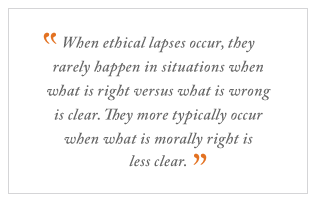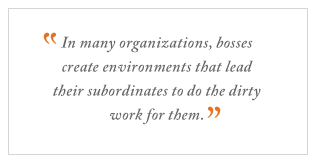According to Hollywood, for every corporate scandal, there's a villain -- some amoral schemer who subverts the system for his personal gain, corrupts those around him, and makes a mint while his company crashes. The truth is, Gordon Gekko types aren't always the ones behind the scandals. Many business debacles are caused by decent people who made some ethically iffy decisions under pressure.
 |
In fact, almost everyone makes decisions that aren't ethical and does things that are more or less moral from time to time. We don't think of ourselves as cads, we don't remember our behavior as unethical, and we don't plan to be unethical in future business dealings. But we are, we did, and we will. That's because, says Dr. Max Bazerman, the Straus Professor at the Harvard Business School and a leading management expert on negotiation and decision making, conflicting loyalties and mixed leadership messages can get in the way of ethical decision making.
Dr. Bazerman has written or edited 16 books and more than 180 research articles and chapters, including a recent research paper called "Why We Aren't as Ethical as We Think We Are: A Temporal Explanation," with Ann E. Tenbrunsel, Kristina A. Diekmann, and Kimberly A. Wade-Benzoni. In this interview, Dr. Bazerman discusses why we don't accurately assess our ethicality, why the nature of decision making can force executives to behave unethically, and the business value of ethics.
GMJ: In your exploration of ethical and unethical behavior, you note that there's a difference in how ethically people predict they'll behave and what they actually do. Why is there such a dichotomy?
Dr. Bazerman: Our observation is that much of what goes wrong isn't caused by bad people doing bad things; it's caused by good people doing bad things without knowing that they're doing something bad. We have many optimistic illusions about ourselves, and we tend to behave unethically in ambiguous contexts.
So when ethical lapses occur, they rarely happen in situations when what is right versus what is wrong is clear. They more typically occur when what is morally right is less clear, such as "doing what is right versus loyalty to the organization," or "doing what is right versus doing what I was told to do," or some other context that causes confusion.
Our minds work quite hard to continue to see ourselves in a positive light. But there are a variety of pressures that lead people to do things that, with more reflection, they might not want to do.
GMJ: So what you're saying is that sometimes we view our unethical behavior as morally OK in context.
Bazerman: Exactly. If I was removed from the situation and judging someone else who was engaged in this behavior, I would see it as wrong. But when I'm in the middle of that situation, I'm focusing on other aspects of the problem, not on the aspect that makes it unethical.
GMJ: Do you think businesses inadvertently permit unethical behavior?
Bazerman: Many people aren't aware that they're doing unethical things. But I think organizations also do things that increase the likelihood of unethical behavior. For example, organizations set goals, such as quarterly earnings targets. Research shows that we're much more likely to behave unethically to meet a goal than we would if that goal hadn't existed. The fact that we set goals, then want to meet them, certainly increases the likelihood that we'll engage in behavior that we otherwise would have viewed as unethical. That doesn't mean goal setting is bad; it means it has problematic features that we often don't think about.
GMJ: How can organizations remove those features?
Bazerman: Organizations can do a better job of making other aspects of performance more salient, including [safeguarding] the reputation of the firm. Many companies have mission statements. Johnson & Johnson, for instance, has a credo, or statement of beliefs, that guides the behavior of the company's employees. But the credo at Johnson & Johnson is literally carved in stone at its New Brunswick, New Jersey, headquarters. Johnson & Johnson people very much feel that to engage in behavior that might be perceived as unethical has strong potential penalties associated with it. So organizations do create cultures that emphasize ethical issues.
But say you take people who are motivated to behave nicely, then give them a fairly weak set of ethical standards to meet. Now, instead of asking them to "do it because it's the right thing to do," you've essentially given them an alternate set of standards -- "do this so you can check off all these boxes."
Imagine an organization, for example, that believes in affirmative action -- one that wants to make the world a better place by creating a more diverse workforce. By reducing ethics to a checklist, suddenly affirmative action is just a bunch of requirements that the organization must meet to show that it isn't discriminating.
Now the organization isn't focused on affirmatively pursuing diversity but rather on making sure that all the boxes are checked off to show that what it did is OK (and so it won't get sued). Before, its workers had an intrinsic motivation to do the right thing, but now they have an extrinsic motivation to make sure that the company doesn't get sued or fined.
The net result is this kind of behavior: "I'm checking off all the boxes and meeting the standards, and I did what I was supposed to do." People are no longer motivated to "do the right thing because it's the right thing to do."
 |
GMJ: In your research, you found that people remember their behavior as being more ethical than it was. Why is that?
Bazerman: It allows us to live with ourselves despite the fact that we do some things that aren't particularly attractive. It creates amazing justifications. Now, don't get me wrong -- I think that sometimes, there are intentional, corrupt processes going on. There are bad people who don't even justify their unethical behavior -- they just want the goodies, and they'll corrupt the system to get the goodies. But most people aren't like that; they want to be ethical. My research colleagues mean to highlight an additional pernicious aspect of unethical behavior rather than letting people who say they didn't know that they behaved unethically off the hook.
GMJ: In your paper "Why We Aren't as Ethical as We Think We Are," you summarize researcher Dolly Chugh's research by saying that "bounded ethicality is exacerbated by the demands of executive life, which causes an overreliance on intuition rather than intentional deliberation." What does that mean for employees and managers?
Bazerman: Basically, it means that if we have time to be reflective about what we're doing, we're less likely to engage in behavior that we would reject as inappropriate. But when life is really, really busy, we could easily imagine doing things that we simply wouldn't want to do if we'd given the matter greater reflection.
Time pressure can make us act expeditiously, which could mean unethically, in ways that we wouldn't when things are more firmly under control. The problem is that when we're in the midst of the action, we're most likely to do something that we wouldn't have otherwise wanted ourselves to do. In the heat of the moment, our impulses take over.
GMJ: So how can managers prevent themselves or their employees from falling into that trap?
Bazerman: Step one is to make it clear what the corporate ethics are and not to send subtle, conflicting signals about what they want. Many organizations do just that; bosses create environments that lead their subordinates to do the dirty work for them. They say, "Just get the deal done, OK? I reward results." Bosses who make statements like that focus people on a set of tasks, and they send an ambiguous message if they don't bother to mention that "I want you to get it done ethically." So managers can start by not engaging in behaviors that move employees in the wrong direction.
Next, managers can look at the data. Say, for example, that an organization is opposed to discrimination based on gender or race, etc. One good thing to do every so often is to examine the data to see who have been the finalists for jobs. That will show managers if they've been making hiring decisions that are race and gender neutral. If they find they've always had an African-American in the final candidate group but that person just never seems to be quite good enough to hire -- and that circumstance occurs over and over again -- that's a signal that they should examine their behavior more systematically.
One organization that I can't name has a video of its senior vice presidents talking about employees who went around their boss because what their boss was doing wasn't appropriate, and these people subsequently have succeeded in this organization. Basically, the message is "If your boss suggests that you behave inappropriately, we want you to go around your boss, because your boss' behavior is unacceptable." If the culture creates an environment that tells employees "When your boss behaves inappropriately, go to your boss's boss," then your boss may be less likely to put these kinds of implicit demands on you to begin with.
GMJ: Ultimately, why do ethics matter? Why should business leaders care about them? Companies can get a lot of wins by behaving unethically.
Bazerman: Most of the people in your readership are successful, and they're not going to run out of dinner money in this lifetime. So my question is, why in the world would they want to be a lousy person to be slightly richer? What benefit do they get?
Another way of looking at it is that by being a better organization, companies can recruit people more effectively. Most people want to work for a high-quality organization rather than a low-quality organization. Consumers want to deal with a reputable company, and businesses want to deal with other reputable organizations. It seems like a better way to go through life -- and do business.
-- Interviewed by Jennifer Robison
